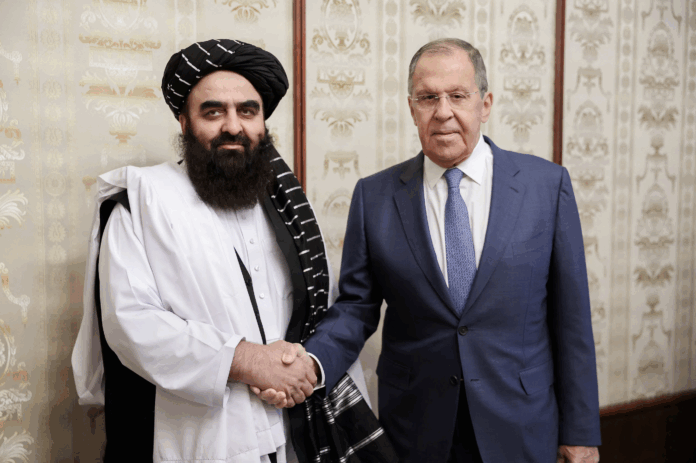Sometimes, a seemingly mundane diplomatic gesture signals a deeper fault line. On 3 July 2025, when Moscow became, quite officially, the first state worldwide to recognise the Taliban’s Islamic Emirate in Kabul, the Western press barely flinched. Yet behind closed embassy doors, policymakers know this is a milestone, one more crack in the crumbling post-9/11 order carefully imposed by Washington’s moral conditionality.
Moscow’s cold realism: when recognition becomes leverage
One word, “recognised”, dropped laconically by Zamir Kabulov, Putin’s special envoy for Afghanistan, was enough to send the message. No fanfare, just an unmistakable shift: Russia recognises Taliban government Afghanistan, and with it, tears up the diplomatic charade that conditioned ties on promises of human rights reforms no Taliban leader ever intended to keep.
In the embassy’s discreet corridor, the new Taliban envoy, Gul Hassan, hands over his credentials to a Russian deputy foreign minister while the black-and-white Taliban flag is hoisted for the first time above the Afghan embassy in Moscow. A snapshot, but a telling one: realism triumphs over moral grandstanding.
When the West lectures, Russia cashes in
The West keeps up its usual sermon: no recognition, no aid, not without girls in schools and press freedom. Moscow sees it differently. It quietly delisted the Taliban from its terrorist blacklist back in April, a bureaucratic footnote, but in hindsight, a clear signal that security interests outweigh moral optics.
Why? Because in the Kremlin’s eyes, a stable Taliban-run Afghanistan, however repressive, is better than an ISIS-K stronghold at Russia’s vulnerable southern rim. It’s classic realpolitik: nod politely at the mullahs, talk cooperation on anti-terror and anti-drug trafficking, and secure trade routes that sidestep Western sanctions.
The ministry’s bland statement about “productive bilateral cooperation” masks sharper truths: energy pipelines, mineral corridors, new roads to Central Asia’s untapped reserves. It’s not charity. It’s leverage.
The subtle signs that the West chooses to ignore
While Brussels issues statements and Washington wrings its hands, who notices that Beijing quietly intensifies its own backchannel with Kabul? That Tehran, ever the opportunist, tests soft influence among Afghanistan’s minorities? That Turkey, the eternal fence-sitter, cultivates its NGO networks under the Taliban’s nose?
Meanwhile, Europe remains a passive funnel for Afghan migrants. Russia plants its flag, literally, and scoops up the dividends of early normalisation. When Berlin or Paris finally realise they’ll have to deal with the Taliban to secure minerals or stem migration, they’ll find Moscow already seated at the table.
A slap in the face of Western moral illusions
So what, you ask, will this recognition really change? For Afghanistan, little: a theocratic clan regime, a narco-economy, a population suffocating under sanctions. But for the global order? Another brick removed.
Russia recognises Taliban government Afghanistan, the keyphrase itself is the headline of a new era: where the realists quietly close the gap between rhetoric and necessity, while the idealists remain stuck in the fog of principles they no longer enforce.
When realpolitik trumps illusions
No illusions here. Moscow’s move is not altruistic. It’s a cold bet that the Taliban can police its own desert in exchange for investment and a fragile promise to keep jihadists at bay. It’s a message to Washington: you lost Kabul, we’ll profit from your vacuum.
One flag, one signature, and an entire region’s balance shifts an inch further East. While Western think tanks hold panels on “inclusive governance”, the new Emirate of Afghanistan now holds its first official recognition, and with it, a dangerous precedent.
Tomorrow, who will be next?



